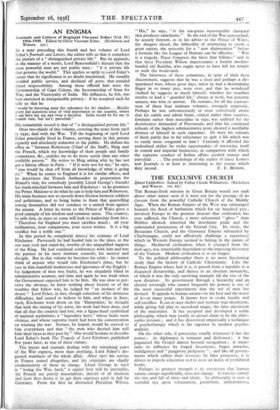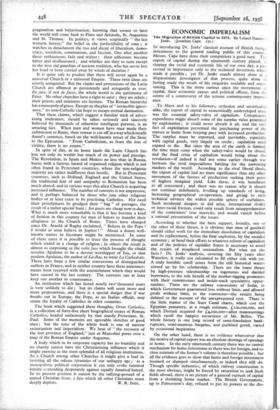THE EXCLUSIVE CHURCH
THE Roman-Irish mission in Great Britain would not rank above other minor sects if it were not for the prestige of its descent from the powerful Catholic Church of the Middle Ages. When the Roman Empire of the West was submerged beneath the flood of barbarism which for six hundred year.; involved Europe in the greatest disaster that civilisation has ever suffered, the Church, a more substantial " ghost " than Hobbes allowed, inherited the inordinate pride and the unbounded pretensions of the Eternal City. Its rivals, the Byzantine Church, and the Germanic Empire refotmdcd by Charlemagne, could not effectively challenge a supremacy which in Western Europe seemed to belong to the nature of things. Mediaeval civilisation, when it emerged from the dark ages, was structurally dependent on the imposing theocracy of the Vatican. Modem civilisation is so no longer.
To the political philosopher there is no more fascinating study than the history of Catholic Christianity. Like the Roman Empire whose heir it is, it passed from a republic to a disguised dictatorship, and thence to an absolute monarchy, of which it was the only surviving example till the rise of the new dictators. Its government through a hierarchy and an elected sovereign who cannot bequeath his powers is one of the most successful experiments that the wit of man has devised. It appeals to human nature—to the best and the worst of it—at many points. It knows how to evoke loyalty and self-sacrifice. It can at once shelter and restrain true mysticism, while giving full play to sacerdotal magic, the false mysticism of the materialist. It has accepted and developed a noble philosophy, which may justify its proud claim to be the philo- sophia perennis ; and it has discovered empirically a technique if psychotherapy which is far superior to modern psycho- analysis.
On the other sidc, it persecutes cruelly whenever it has the power ; its diplomacy is tortuous and dishonest ; it has paganised the Gospel almost beyond recognition ; it main- tains its influence by forged documents, bogus miracles, indulgences and "purgatory pickpurse " ; and like all govern- ments which collect their revenues by false pretences, it is driven to impede education and to issue an index of prohibited books.
Perhaps its greatest strength is its conviction that human nature, except superficially, does not change. It watches calmly the rise and tall of ideas and ideals. In philosophy it casts a scornful eye upon voluntarism, positivism, utilitarianisr.t, pragmatism and behaviourism, knowing that sooner or later the world will come back to Plato and Aristotle, St. Augustine and St. Thomas. In politics, it views sceptically " the last western heresy," the belief in the perfectibility of man ; it watches in detachment the rise and decay of liberalism, demo- cracy, socialism, communism, and fascism. One after another these enthusiasms fade and wither ; their adherents become bitter and disillusioned ; and whither are they to turn except to the wise old guardian of ancient tradition, who has never lost her head or been carried away by winds of doctrine ?
It is quite safe to predict that there will never again be a universal Church or a universal Empire. These twin ideas are utterly antiquated. But the claims and pretensions of the Latin Church are affirmed as persistently and arrogantly as ever. De jure, if not de facto, the whole world is the patrimony of Peter. No other churches have a right to exist ; they are rebels ; their priests and ministers are laymen. The Roman hierarchy has a monopoly of grace. Except on the plea of "invincible ignor- ance," no non-Catholic can hope to escape eternal damnation.
That these claims, which suggest a familiar trick of adver- tising tradesmen, should be taken seriously and sincerely believed by thousands of otherwise intelligent persons, is an amazing fact. When men and women have once made their submission to Rome, their retreat is cut off in a way which recalls Amiel's sentence, based on the well-known retort of the Stoic to the Epicurean. "From Catholicism, as from the loss of virility; there is no return."
In spite of this, in its home lands the Latin Church has lost not only its wealth but much of its power and prestige. The Revolution, in Spain and Mexico no less than in Russia, burns with a furious hatred of organised religion which is not often found in Protestant countries, where the non-religious majority are rather indifferent than hostile. But in Protestant countries, such as Holland, England and the United, States, the traditional fear of and antipathy to Romanism has been much abated, and in various ways this alien Church is acquiring increased influence. The number of converts is not impressive, and is perhaps balanced by those who join other religious bodies or at least cease to be practising Catholics. Nor need their proselytisers be grudged their " bag " of peerages, the result of a rather special hunt ; for peers are cheap now-a-days. What is much more remarkable is that it has become a kind of fashion in this country for men of letters to transfer their allegiance to the Church of Rome. Times have changed since Dr. Arnold of Rugby exclaimed, "Believe in the Pope ! I would as soon believe in Jupiter ! " About a dozen well- known names in literature might be mentioned. In some of these cases it is possible to trace the process of thought which ended in a change of religion ; in others the result is almost as surprising as the volte face which brought the ribald. novelist Apuleius to be a devout worshipper of Isis, or that modern Apuleius, the author of Lei-Bas, to write La Cathidrale. There have been a few similar conversions of distinguished authors in France, and in neither country have these announce- ments been received with the astonishment which they would have caused in the last century. The converts can at least keep one another in countenance.
An institution which has lasted nearly two' thousand years is very unlikely to die ; but its claims will seem more and more preposterous, and there is a special danger that if war breaks out in Europe, the Pope, as an Italian official, may strain the loyalty of Catholics in other countries.
The book which suggested these thoughts, Great Catholics, is a collection of forty-five short biographical essays of Roman Catholics, headed audaciously by that sturdy Protestant, St. Paul. Some of the memoirs are agreeable sketches of good men ; but the tone of the whole book is one of narrow sectarianism and imperialism. We hear of "the recovery of the lost province of England," just as Mussolini pores over a snap of the Roman Empire under Augustus.
A body which in its corporate capacity has no humility and no charity cannot have the Christianising influence which it might exercise as the most splendid of all religious institutions. As a Church among other Churches it might give a lead in resisting all the odious tyrannies of our unhappy age ; as a monopolistic political corporation it can only evoke fanatical loyalty ccntending desperately against equally fanatical hatred. In its present position it cannot be the rallying-ground of a united Christian front, a fact which all other Christians must











































 Previous page
Previous page